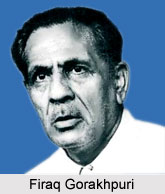 Raghupati Sahay was born on 28th August 1896 and wrote poems and ghazals under the pen name Firaq Gorakhpuri. He, according to many, was a prolific writer, critic, and one of the most noted contemporary Urdu poets from India. He also established himself among peers including Muhammad Iqbal, Yagana Changezi, Jigar Moradabadi and Josh Malihabadi.
Raghupati Sahay was born on 28th August 1896 and wrote poems and ghazals under the pen name Firaq Gorakhpuri. He, according to many, was a prolific writer, critic, and one of the most noted contemporary Urdu poets from India. He also established himself among peers including Muhammad Iqbal, Yagana Changezi, Jigar Moradabadi and Josh Malihabadi.
Life of Raghupati Sahay
Raghupati Sahay was born in a modest Hindu Kayasth family in the village of Gorakhpur in the year 1896. Later, of course, he was selected for the Provincial Civil Service (P.C.S.) and the Indian Civil Service (I.C.S.), which is resigned after a certain time to join the freedom struggle of India. He joined hands with Mahatma Gandhi for Non-cooperation movement and was sent to jail for the same.
After the stint he joined, as a lecturer of English Literature, at the Allahabad University. It was here that he wrote most of his Urdu poetry which of course included his magnum opus Gul-e-Naghma which earned him the highest literary award of India, the Jnanpith Award, and also the 1960 Sahitya Akademi Award in Urdu. During the course of his life he was also given the designation of Research Professor at the University Grants Commission and Producer Emeritus by All India Radio. After a long illness, he died on March 3, 1982, in New Delhi.
Firaq Gorakhpuri, as a renowned poet, was well aware of all the conventional forms of Urdu poetry. He was a prolific writer, having written more than a dozen volumes of Urdu poetry, a half dozen of Urdu prose, several volumes on literary themes in Hindi, as well as four volumes of English prose on literary and cultural subjects
Works of Raghupati Sahay
Gul-e-Naghma
Gul-e-Ra`naa
Mash`aal
Rooh-e-Kaayenaat
Roop (Rubaayi)
Shabistaan
Sargam
Bazm-e-Zindagi Rang-e-Shayri
Urdu Ki Ishqia Shayeri (Urdu Love Poetry)
Awards Received by Raghupati Sahay
1960 - Sahitya Akademi Award in Urdu
1968 - Padma Bhushan
1968 - Soviet Land Nehru Award
1969 - Jnanpith Award (First Jnanpith Award for Urdu literature)
1970 - Sahitya Akademi Fellowship
1981 - Ghalib Academi Award
This article is a stub. You can enrich by adding more information to it. Send your Write Up to content@indianetzone.com



















